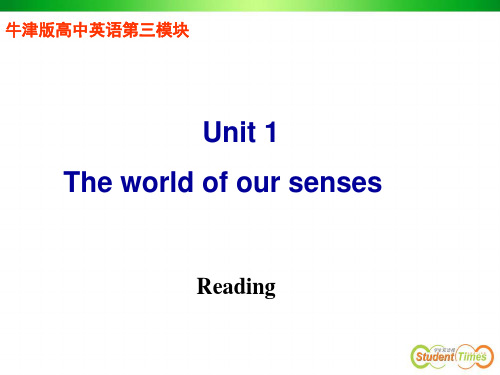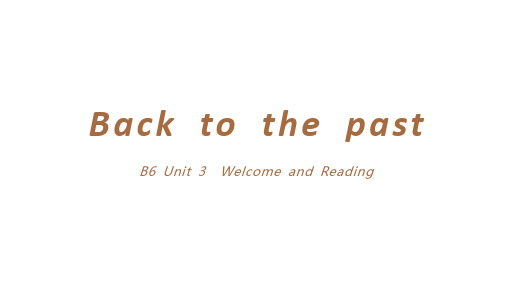牛津高中英语模块三 reading课件
合集下载
牛津高中英语模块三reading课件

In 1066,_t_h_e__N_o_r_m_a_n_s__d_e_fe_a_t_e_d_E_n_g_l_a_n_d__a_n_d_t_o_o_k_c_o_n_t_r_o_l _ _o_f__th_e__co_u__n_tr_y.However, during the 250 years,___F_r_e_n_c_h__ __d_id_n_’_t_r_e_p_la_c_e__E_n_g_l_is_h_a_s__t_h_e_f_i_rs_t_l_a_n_g_u_a_g_e_. ___________ By the later half of the 14th century__E_n_g_l_is_h_h__a_d_c_o_m__e___ ___in_t_o_w__id_e_s_p_r_ea_d__u_s_e__in__E_n_gland . In 1399, _E__n_g_li_s_h_w__a_s_u_s_e_d_f_o_r_a_l_l _o_ff_i_c_ia_l_e_v_e_n_ts_._________
Time
Before the middle of 5th century
5th---9th century
At the end of 9th
By the 10th century
Event
language
Celtic
Two Germanic groups occupied Britain The Vikings began to move Britain
English words from Chinese:
Pingpong, kongfu, tofu, lose face,
5. The Normans occupied England in 1_0__6_6_.
Time
Before the middle of 5th century
5th---9th century
At the end of 9th
By the 10th century
Event
language
Celtic
Two Germanic groups occupied Britain The Vikings began to move Britain
English words from Chinese:
Pingpong, kongfu, tofu, lose face,
5. The Normans occupied England in 1_0__6_6_.
牛津英语模块三UnitReading共28页文档

fear
ask for
danger
help
fog
get lost
confuse
blind
accident
1.What is the story about?
A young lady in the fog.
2.Where did Polly live?
At 86 King Street.
3. Who helped Polly?
Polly's thought or feeling
Outside Polly's Part 1 work place
At 4 p.m. foggy
her face. 8 8. Polly got to King Street safely. 1 9. Polly left the office at four o’clock. 10 10. The old man went to help others .
Word study
1. forcast 2. fare 3. narrow 4. stare 5. watch out for 6. relief
牛津版高中英语第三模块
Unit 1 The world of our senses
Reading
Fog
What’s the weather like in these pictures?
What can you think of when the word “fog” is mentioned?
An old blind man.
4.What was the old man carrying?
A stick.
True or false
牛津英语模块三UnitReading-课件

The fog lay like a thick, grey cloud.
4 According to lines 23-25, what made Polly afraid?
The rough hand that brushed her face, and the man’s voice that was close to her ear made Polly afraid. 5. According to line 33, what did the man look
fear
ask for
danger
help
fog
get lost
confuse
blind
accident
1.What is the story about?
A young lady in the fog.
2.Where did Polly live?
At 86 King Street.
3. Who helped Polly?
2 1. Polly took the Underground to Green Park . 6 2. An old man took Polly’s hand. 5 3. A hand reached out and grased Polly’s arm. 9 4. Polly thanked the blind man. 3 5. A tall man in a dark coat was watching Polly. 7 6. Polly and the old man turned left at the crossroads. 4 7. Polly felt frightened when a rough hand brushed
4 According to lines 23-25, what made Polly afraid?
The rough hand that brushed her face, and the man’s voice that was close to her ear made Polly afraid. 5. According to line 33, what did the man look
fear
ask for
danger
help
fog
get lost
confuse
blind
accident
1.What is the story about?
A young lady in the fog.
2.Where did Polly live?
At 86 King Street.
3. Who helped Polly?
2 1. Polly took the Underground to Green Park . 6 2. An old man took Polly’s hand. 5 3. A hand reached out and grased Polly’s arm. 9 4. Polly thanked the blind man. 3 5. A tall man in a dark coat was watching Polly. 7 6. Polly and the old man turned left at the crossroads. 4 7. Polly felt frightened when a rough hand brushed
牛津译林版高中英语选择性必修第三册Unit 3 Reading 课件 (共18张PPT)

Welcome to the unit
• If you had such a time machine, would you like to travel back to the past ? or to the future?
• Why?
Sailing the oceans
What difficulties did explorers face in the past?
Zheng He--Para 1
“A fleet of over 200 ships navigated the blue seas, with almost 28,000 people on board, which was a splendid scene. It would take 500 years before a larger fleet salied the seas. According to some records, the largest ships were over 140 metres in length...”
• poor navigational tools • lack of adequate supplies • sickness and starvation. • fear of the unknown.
Zheng He--Para 1
• How does the author begin his article?
Voyages of Zheng He
Zheng He--Para 2-3 • What’s the far-reaching impcat of Zheng He’s voyages?
Zheng He--Para 4
Unit3GettingalongwithothersReading课件高中英语牛津译林版(2020

girl in a cafe later. Amy's heart was broken. Now she
doesn't feel like _re__s_p_o_n__d_i_n_g__ to any of her online
messages and she is ___a_t___ a loss what to do next.
真正的朋友从不追究你的过错,也不嫉妒你的成功。 A true friend is one soul in two bodies.
真正的朋友是异体同心。 The best mirror is a friend's eye.
朋友的眼睛是最好的镜子。 Prosperity makes friends, adversity tries them.
3 . Amy’s heart was broken last Saturday. Which of the
following is the main reason? A.The girl didn’t turn up at the cinema. B.The girl said she had a bad cold.
To see a film at the cinema.
3. How did Amy learn that her friend went to a cafe?
Amy's classmate told her that.
4. What does Cindy mean by “her behaviour” in line 20?
How:
To have a full and frank talk. To listen to what she has to say. To explain how you feel.
牛津高中英语模块三第二单元reading课件

integrate the new
vocabulary
into
sentences...
Sentence Analysis
03
Understanding Long Sentences
识别主句和从句
长句通常包含一个主句和多个从句。 学生需要学会识别主句,理解从句的 作用,以及它们如何与主句相互关联 。
Exploration of article details
Details
• Analyze the language used in the article, including sentence structure, vocabulary, and grammar.
• Examine the organization and structure of the article, noting any patterns or transitions.
The author uses real-life examples and case studies to illustrate the impact of social media on mental health.
Article structure
• The article is divided into three main sections: the impact of social media on mental health, strategies to promote positive mental well-being, and结论
Reflection and reflection on the article
• Evaluate the article's strengths and weaknesses, considering factors such as clarity, accuracy, and relevance.
- 1、下载文档前请自行甄别文档内容的完整性,平台不提供额外的编辑、内容补充、找答案等附加服务。
- 2、"仅部分预览"的文档,不可在线预览部分如存在完整性等问题,可反馈申请退款(可完整预览的文档不适用该条件!)。
- 3、如文档侵犯您的权益,请联系客服反馈,我们会尽快为您处理(人工客服工作时间:9:00-18:30)。
Sonnet No. 18
Shall I compare thee to a summer's day? Thou art more lovely and more temperate: Rough winds do shake the darling buds of May, And summer's lease hath all too short a date:
English words from Chinese:
Pingpong, kongfu, tofu, lose face,
9th century
10th century 1066
14th century 16th century
1. Before the middle of the _5_t_h__c_e_n_t_u_r_y_, people in Britain did not speak English.
2. Modern English began to develop in the 1_6__th__c_e_n_t_u_r_y_.
man- men
French way
shoe—shoes
Foot – feet
house—houses
tooth — teeth glass — glasses
Child — children
The word for the animal:
pi
cow
sheep
g
The word for the meat:
beef
mutton
pork / bacon
Modern English
1. When did modern English begin? Modern English began during the Renaissance in the 16th century.
2. What changes happened during this period of time? English includes many Latin and Greek words. Pronunciation also went through huge changes .
French’s impact(影响) on English:
1. More words with similar meanings
3. French ways of making plurals
2. Borrowed words for meat: mutton/ beef/pork
Many words with similar meanings
2. Where did the word English come from? It came from the word Engle, as it was spelt in Old English.
3. Why can words with similar meanings be found in the English language?
5. The Normans occupied England in 1_0__6_6_.
6. By the _1_0_t_h__c_e_n_t_u_r_y_, people in England used Old English as the official language.
Skimming to get
Anglo-Saxon (base of old English)
Old English
CAenlgtilco-Saxon (base)
Old English
language of Norway
( official language)
language of Denmark
Middle English
Please go through the Reading strategy and tell me how to read a history article.
Reading a history article
Reading a normal text
1. Notice dates and years. 2. Make a time chart, listing
the same meaning ( 生病的)
ill Norse
sick Anglo-Saxon
More words with similar meanings.
the same meaning (回答)
reply
French
answer
Old English
Making plurals
Germanic way
In 1066,_t_h_e__N_o_r_m_a_n_s__d_e_fe_a_t_e_d_E_n_g_l_a_n_d__a_n_d_t_o_o_k_c_o_n_t_r_o_l _ _o_f__th_e__co_u__n_tr_y.However, during the 250 years,___F_r_e_n_c_h__ __d_id_n_’_t_r_e_p_la_c_e__E_n_g_l_is_h_a_s__t_h_e_f_i_rs_t_l_a_n_g_u_a_g_e_. ___________ By the later half of the 14th century__E_n_g_l_is_h_h__a_d_c_o_m__e___ ___in_t_o_w__id_e_s_p_r_ea_d__u_s_e__in__E_n_gland . In 1399, _E__n_g_li_s_h_w__a_s_u_s_e_d_f_o_r_a_l_l _o_ff_i_c_ia_l_e_v_e_n_ts_._________
Language borrows words from each other, can you list some of them?(page25 part F)
Chinese words from English:
Coffee(咖啡), sofa(沙发), model(模特儿), modern(摩登), Sandwich(三明治), hamburger(汉堡), cartoon(卡通)
These words with similar meanings developed because each word came from a different language.
4. Who made the greatest contribution to the development from Old English to Middle English? The French-speaking Normans, who took control of England in 1066.
general ideas
Skimming
Reading Comprehension I
The topic of the text is _____________. A. that d English is different from
the English today B. how Middle English formed C. English and its history D. that English will keep changing
3. Is Modern English the end of all these changes? No , English will keep on changing.
The development of English
Old English
Celtic
Languages
Old English of Germanic
groups
Old English
Old English
Languages of Vikings
Middle English
Old English
Middle English French
Modern English
Middle English
Latin and Greek
Discuss the following questions with your partner.
The United Kingdom of Great Britain and Northern Ireland.
Chinese characters are always changing!
1. Do you think English has always stayed the same?
Time
Before the middle of 5th century
5th---9th century
At the end of 9th
By the 10th century
Event
language
Celtic
Two Germanic groups occupied Britain The Vikings began to move Britain
Skimming
Reading Comprehension II
1.What are the three kinds of English discussed in the article? Old English, Middle English and Modern English.
2. In what way is English still changing? English is still changing in many ways, such as in vocabulary and pronunciation.
Shall I compare thee to a summer's day? Thou art more lovely and more temperate: Rough winds do shake the darling buds of May, And summer's lease hath all too short a date:
English words from Chinese:
Pingpong, kongfu, tofu, lose face,
9th century
10th century 1066
14th century 16th century
1. Before the middle of the _5_t_h__c_e_n_t_u_r_y_, people in Britain did not speak English.
2. Modern English began to develop in the 1_6__th__c_e_n_t_u_r_y_.
man- men
French way
shoe—shoes
Foot – feet
house—houses
tooth — teeth glass — glasses
Child — children
The word for the animal:
pi
cow
sheep
g
The word for the meat:
beef
mutton
pork / bacon
Modern English
1. When did modern English begin? Modern English began during the Renaissance in the 16th century.
2. What changes happened during this period of time? English includes many Latin and Greek words. Pronunciation also went through huge changes .
French’s impact(影响) on English:
1. More words with similar meanings
3. French ways of making plurals
2. Borrowed words for meat: mutton/ beef/pork
Many words with similar meanings
2. Where did the word English come from? It came from the word Engle, as it was spelt in Old English.
3. Why can words with similar meanings be found in the English language?
5. The Normans occupied England in 1_0__6_6_.
6. By the _1_0_t_h__c_e_n_t_u_r_y_, people in England used Old English as the official language.
Skimming to get
Anglo-Saxon (base of old English)
Old English
CAenlgtilco-Saxon (base)
Old English
language of Norway
( official language)
language of Denmark
Middle English
Please go through the Reading strategy and tell me how to read a history article.
Reading a history article
Reading a normal text
1. Notice dates and years. 2. Make a time chart, listing
the same meaning ( 生病的)
ill Norse
sick Anglo-Saxon
More words with similar meanings.
the same meaning (回答)
reply
French
answer
Old English
Making plurals
Germanic way
In 1066,_t_h_e__N_o_r_m_a_n_s__d_e_fe_a_t_e_d_E_n_g_l_a_n_d__a_n_d_t_o_o_k_c_o_n_t_r_o_l _ _o_f__th_e__co_u__n_tr_y.However, during the 250 years,___F_r_e_n_c_h__ __d_id_n_’_t_r_e_p_la_c_e__E_n_g_l_is_h_a_s__t_h_e_f_i_rs_t_l_a_n_g_u_a_g_e_. ___________ By the later half of the 14th century__E_n_g_l_is_h_h__a_d_c_o_m__e___ ___in_t_o_w__id_e_s_p_r_ea_d__u_s_e__in__E_n_gland . In 1399, _E__n_g_li_s_h_w__a_s_u_s_e_d_f_o_r_a_l_l _o_ff_i_c_ia_l_e_v_e_n_ts_._________
Language borrows words from each other, can you list some of them?(page25 part F)
Chinese words from English:
Coffee(咖啡), sofa(沙发), model(模特儿), modern(摩登), Sandwich(三明治), hamburger(汉堡), cartoon(卡通)
These words with similar meanings developed because each word came from a different language.
4. Who made the greatest contribution to the development from Old English to Middle English? The French-speaking Normans, who took control of England in 1066.
general ideas
Skimming
Reading Comprehension I
The topic of the text is _____________. A. that d English is different from
the English today B. how Middle English formed C. English and its history D. that English will keep changing
3. Is Modern English the end of all these changes? No , English will keep on changing.
The development of English
Old English
Celtic
Languages
Old English of Germanic
groups
Old English
Old English
Languages of Vikings
Middle English
Old English
Middle English French
Modern English
Middle English
Latin and Greek
Discuss the following questions with your partner.
The United Kingdom of Great Britain and Northern Ireland.
Chinese characters are always changing!
1. Do you think English has always stayed the same?
Time
Before the middle of 5th century
5th---9th century
At the end of 9th
By the 10th century
Event
language
Celtic
Two Germanic groups occupied Britain The Vikings began to move Britain
Skimming
Reading Comprehension II
1.What are the three kinds of English discussed in the article? Old English, Middle English and Modern English.
2. In what way is English still changing? English is still changing in many ways, such as in vocabulary and pronunciation.
